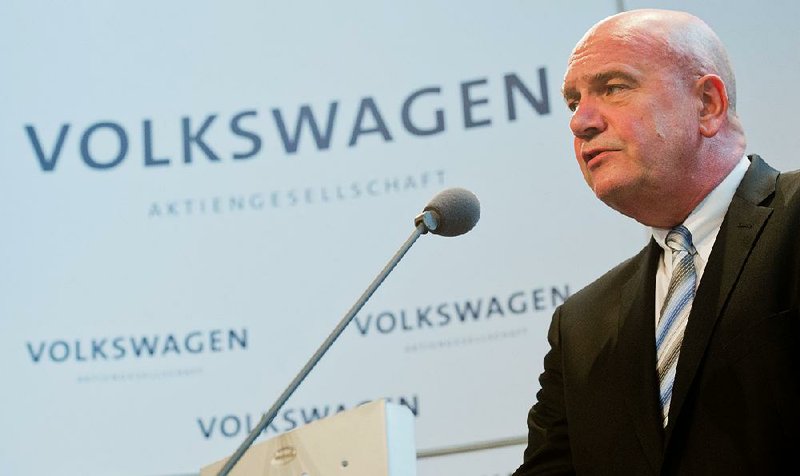FRANKFURT, Germany -- Volkswagen's new chief executive warned Tuesday that the financial impact from the company's emissions cheating diesel engines would be more damaging than previously acknowledged, saying the company would delay or cancel planned new investments and might have to cut jobs.
Volkswagen had already said that it would set aside a little more than $7 billion to cover the cost of bringing as many as 11 million affected vehicles into compliance with emissions standards.
"But that will not be enough," Matthias Mueller, the Volkswagen chief executive, told workers at the company's main factory in Wolfsburg, Germany, on Tuesday.
Mueller said it was impossible to calculate the cost from penalties that Volkswagen was likely to face from governments including that of the United States, or from lawsuits that are proliferating from unhappy customers and shareholders. For now, the company will delay or cancel new projects that are not considered essential, he said, according to a text of his remarks.
Mueller, who was appointed chief executive last month after his predecessor, Martin Winterkorn, resigned, also did not rule out job cuts stemming from the damage that Volkswagen has suffered financially and to its reputation after revelations that 11 million diesel cars, mostly in Europe and the United States, had software intended to fool emissions tests.
The company will do everything it can to preserve jobs, Mueller said, but he added: "All of this will not be painless."
Mueller said a substantial number of high-ranking managers had been suspended in connection with what he promised would be a ruthless inquiry into who was responsible for the cheating vehicles.
He did not give the names of those executives suspended, but three of them -- whose suspensions had been previously disclosed -- are people associated with the development and deployment of the engines with the software.
They are: Ulrich Hackenberg, head of development for all Volkswagen Group brands, and previously head of development for Volkswagen-brand cars from 2007 to 2013; Heinz-Jakob Neusser, currently head of development for the Volkswagen brand; and Wolfgang Hatz, head of engines and transmissions development for all Volkswagen brands.
Analysts have been warning that the cost to Volkswagen would be more than the $7.3 billion estimated by the company.
The head of Volkswagen's influential employee council said later Tuesday that the scandal won't have any immediate effect on jobs.
"It is not possible to say today whether and how this wrongdoing could affect our jobs in the medium and long term," Bernd Osterloh told reporters. But "at the moment ... there are no consequences for jobs," including those of temporary workers, he said.
Employees at Volkswagen's German factories at the very least face a possible reduction in their profit-sharing checks. Those under the union contract received $6,647 bonuses for 2014, when the company made net profit of $12.2 billion. Analysts have been lowering profit forecasts for this year and next.
Mueller said some of the affected cars could be fixed by adjusting the software, while others would need hardware fixes. He didn't elaborate.
Volkswagen has until today to give German regulators a binding timetable that sets out when it will have a fix for the cars in the country and by when it can be implemented.
Osterloh said Mueller's speech went down well with employees, and added that he "can count on the support of employees to put Volkswagen back on the right track."
Osterloh sits on Volkswagen's supervisory board -- the German equivalent of a board of directors -- as does the governor of Lower Saxony state, which is a minority shareholder.
In a letter to VW employees released Tuesday, state Gov. Stephan Weil said it is "intolerable" for the whole company and workforce to be placed under "general suspicion" as a result of the emissions cheating.
"I am aware that work at Volkswagen is the livelihood for many thousands of employees and their families, worldwide and above all here in Lower Saxony," Weil said. "So I view it as our task to work with all our strength for the security of these jobs."
The costs of the fines, lawsuits and recalls Volkswagen faces are hard to estimate but have the potential to snowball.
Marc-Rene Tonn, an analyst at Warburg Research, said they could exceed $39 billion.
A chunk of that would come from fines from the U.S. Environmental Protection Agency, which could amount to as much as $18 billion. In theory, each of the 482,000 cars identified as having the deceptive software could generate a $37,500 penalty. The actual fine will likely be much lower if the company cooperates with authorities. Tonn says it could reach $14 billion.
The carmaker faces dozens of lawsuits from individual states and counties in the United States. One county in Texas is seeking penalties worth $100 million, and that's just one lawsuit.
Volkswagen may also face fines in other countries where it sold such rigged cars if there is evidence it cheated on emissions tests there, too. It is being investigated in Germany and other European countries.
Customers who feel cheated are going after Volkswagen as well, with several class-action lawsuits already filed in the U.S. and Europe. That could amount to billions more in damages.
And the cost of recalling and fixing the cars could run $2.2 billion beyond what Volkswagen set aside, Tonn wrote in a research note to investors.
Information for this article was contributed by Jack Ewing of The New York Times and David McHugh, Geir Moulson and Pan Pylas of The Associated Press.
Business on 10/07/2015

